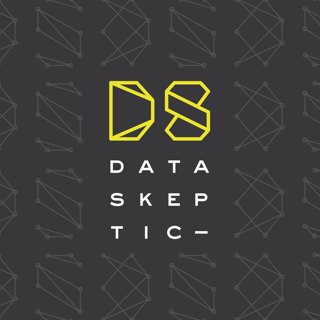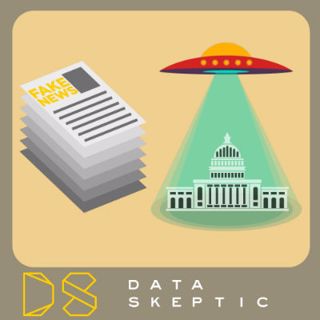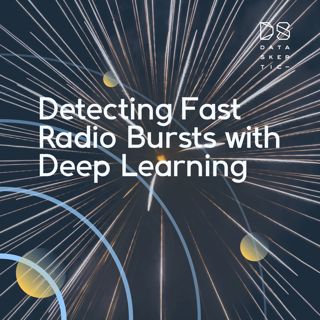
Sign Language Recognition
At the NeurIPS 2018 conference, Stradigi AI premiered a training game which helps players learn American Sign Language. This episode brings the first of many interviews conducted at NeurIPS 2018. In this episode, Kyle interviews Chief Data Scientist Carolina Bessega about the deep learning architecture used in this project. The Stradigi AI team was exhibiting a project called the American Sign Language (ASL) Alphabet Game at the recent NeurIPS 2018 conference. They also published a detailed blog post about how they built the system found here.
14 Joulu 201819min

Data Ethics
This week, Kyle interviews Scott Nestler on the topic of Data Ethics. Today, no ubiquitous, formal ethical protocol exists for data science, although some have been proposed. One example is the INFORMS Ethics Guidelines. Guidelines like this are rather informal compared to other professions, like the Hippocratic Oath. Yet not every profession requires such a formal commitment. In this episode, Scott shares his perspective on a variety of ethical questions specific to data and analytics.
7 Joulu 201819min

Escaping the Rabbit Hole
Kyle interviews Mick West, author of Escaping the Rabbit Hole: How to Debunk Conspiracy Theories Using Facts, Logic, and Respect about the nature of conspiracy theories, the people that believe them, and how to help people escape the belief in false information. Mick is also the creator of metabunk.org. The discussion explores conspiracies like chemtrails, 9/11 conspiracy theories, JFK assassination theories, and the flat Earth theory. We live in a complex world in which no person can have a sufficient understanding of all topics. It's only natural that some percentage of people will eventually adopt fringe beliefs. In this book, Mick provides a fantastic guide to helping individuals who have fallen into a rabbit hole of pseudo-science or fake news.
30 Marras 201833min
![[MINI] Theorem Provers](https://cdn.podme.com/podcast-images/161A1CB5D6CB1C99C43010861E49428F_small.jpg)
[MINI] Theorem Provers
Fake news attempts to lead readers/listeners/viewers to conclusions that are not descriptions of reality. They do this most often by presenting false premises, but sometimes by presenting flawed logic. An argument is only sound and valid if the conclusions are drawn directly from all the state premises, and if there exists a path of logical reasoning leading from those premises to the conclusion. While creating a theorem does feel to most mathematicians as a creative act of discovery, some theorems have been proven using nothing more than search. All the "rules" of logic (like modus ponens) can be encoded into a computer program. That program can start from the premises, applying various combinations of rules to inference new information, and check to see if the program has inference the desired conclusion or its negation. This does seem like a mechanical process when painted in this light. However, several challenges exist preventing any theorem prover from instantly solving all the open problems in mathematics. In this episode, we discuss a bit about what those challenges are.
23 Marras 201818min

Automated Fact Checking
Fake news can be responded to with fact-checking. However, it's easier to create fake news than the fact check it. Full Fact is the UK's independent fact-checking organization. In this episode, Kyle interviews Mevan Babakar, head of automated fact-checking at Full Fact. Our discussion talks about the process and challenges in doing fact-checking. Full Fact has been exploring ways in which machine learning can assist in automating parts of the fact-checking process. Progress in areas like this allows journalists to be more effective and rapid in responding to new information.
16 Marras 201831min
![[MINI] Single Source of Truth](https://cdn.podme.com/podcast-images/161A1CB5D6CB1C99C43010861E49428F_small.jpg)
[MINI] Single Source of Truth
In mathematics, truth is universal. In data, truth lies in the where clause of the query. As large organizations have grown to rely on their data more significantly for decision making, a common problem is not being able to agree on what the data is. As the volume and velocity of data grow, challenges emerge in answering questions with precision. A simple question like "what was the revenue yesterday" could become mired in details. Did your query account for transactions that haven't been finalized? If I query again later, should I exclude orders that have been returned since the last query? What time zone should I use? The list goes on and on. In any large enough organization, you are also likely to find multiple copies if the same data. Independent systems might record the same information with slight variance. Sometimes systems will import data from other systems; a process which could become out of sync for several reasons. For any sufficiently large system, answering analytical questions with precision can become a non-trivial challenge. The business intelligence community aspires to provide a "single source of truth" - one canonical place where data consumers can go to get precise, reliable, and trusted answers to their analytical questions.
9 Marras 201829min

Detecting Fast Radio Bursts with Deep Learning
Fast radio bursts are an astrophysical phenomenon first observed in 2007. While many observations have been made, science has yet to explain the mechanism for these events. This has led some to ask: could it be a form of extra-terrestrial communication? Probably not. Kyle asks Gerry Zhang who works at the Berkeley SETI Research Center about this possibility and more importantly, about his applications of deep learning to detect fast radio bursts. Radio astronomy captures observations from space which can be converted to a waterfall chart or spectrogram. These data structures can be formatted in a visual way and also make great candidates for applying deep learning to the task of detecting the fast radio bursts.
2 Marras 201844min

Being Bayesian
This episode explores the root concept of what it is to be Bayesian: describing knowledge of a system probabilistically, having an appropriate prior probability, know how to weigh new evidence, and following Bayes's rule to compute the revised distribution. We present this concept in a few different contexts but primarily focus on how our bird Yoshi sends signals about her food preferences. Like many animals, Yoshi is a complex creature whose preferences cannot easily be summarized by a straightforward utility function the way they might in a textbook reinforcement learning problem. Her preferences are sequential, conditional, and evolving. We may not always know what our bird is thinking, but we have some good indicators that give us clues.
26 Loka 201824min






















